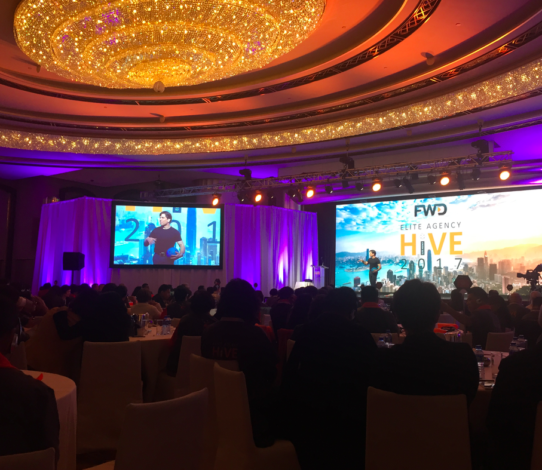
If you were watching a man juggle a bowling ball and he suddenly threw it three meters into the air only to have it drop straight down on his head, do you think you would remember it?
I just did and I can tell you that you would.
The man who did this seemingly idiotic stunt was Dan Thurmon, and he did it to make a point.
Dan is a professional speaker and a professional juggler and he uses his juggling skills to turn his keynote slot into a performance.
He spoke at a conference in Hong Kong today just before I went up to deliver my own keynote.

I have seen many speakers use props on stage, but I must say that Dan was one of the best I have seen when it comes to using his props to reinforce his message.
In the example of “dropping a bowling ball on his head” Dan had earlier described to the audience how we all juggle many things in our life.
That was of course referenced to the obvious idea of juggling many balls, but then he took the metaphor one step furthered and described to the audience how we all have some things that are “heavier” for us to juggle (problems, a dilemma or predicament that is weighing us down). To illustrate this Dan and exchanged one of the juggling pins for a bowling ball. While struggling to juggle with the heavy ball he told us to think about the heavy thing we have in our lives.
And just as we as an audience was thinking of the things that was weighing us down he suddenly threw the bowling ball high into the air so that it crashed onto his forehead with great speed.
The audience let out a collective “OH!”, shocked at what they had just seen.
But to their, and my, surprise Dan just smiled seemingly unaffected by the impact.
It took a few seconds for the audience to understand that Dan had tricked us – the “heavy bowling ball” was in reality a light, rubber ball designed (!) to look like a bowling ball…
While he effortlessly tossed the fake bowling ball in his hand he reminded us that many things that people may think of as heavy problems in reality might not be heavy problems at all.
Dan Thurmon is the kind of speaker who relies very much on props and symbolism in his speeches. When I talked to him after the conference he explained to me that to him the props are there to help re-inforce a message – not to re-inforce the speaker.
A prop, per definition, is “a person or thing that is a major source of support or assistance.”
Assistance to the message that is.

Personally I almost never use props (unless we choose to define Keynote as a prop), but handled right they can be very powerful. Handled wrongly they can be a disaster.
If you are going to use props as a speaker make sure the props are supporting the message – by making the message easier to remember, easier to re-tell to a friend, more visual (for the people who learn visually), or more impactful, for example.
I am afraid that I have seen many speakers choose to use props in the wrong way. Those speakers use props not as ways to support their message, but to draw attention to themselves, or worse, to distract from themselves or the message.
If the audience remembers that there was a very good juggler at the conference who dropped a fake bowling ball on his head the whole idea of inviting Dan to speak would have been a waste of money.
The ball is not used to be remembered – it’s there to help people remember the message. (In this case that thing that we see as heavy problems might not be as heavy as we think.)
That is the what the people in Hong Kong will remember long after the conference.
I, as a professional speaker, will also remember how Dan mastered not only juggling and speaking at the same time – but also the balance between impressing the audience with props and tricks – and making sure they get the message of his speech.
Is there a prop you could use in your speeches to support your message?
If you are already using props – is there a way you could strengthen the message that the prop is there to enhance?

